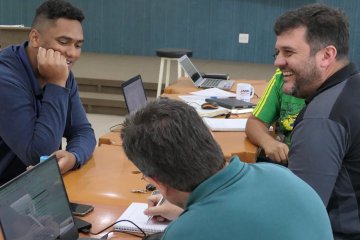Deep Learning That Transforms
As a young theology professor, I used to try to teach my students as much information as possible. I had learned it. I saw its value. There was a lot. So I lectured.
As I had experienced while a student in several seminary classes, I was now trying to fill my students' spoons with a blasting faucet. Not everything would stay in the spoon, of course. Some would run over the side. But some valuable liquid would remain, surely. Bigger spoons will retain more. Smaller spoons less. But all will be filled up, I thought.
While cooking dinner one evening, I held a tablespoon under the faucet. The deluge did not fill the spoon to its brim before the excess ran over. It even blasted out whatever might have stayed in the spoon. No water remained. Maybe a few drops. More was on my clothes.
Three Principles of Education
At Training Leaders International (TLI), three principles guide our design, development, and delivery of biblical and theological education to Majority World pastors:
(1) We go deeper in fewer areas.
(2) We focus on skills while providing rich content.
(3) We engage the text, then do theology.
In this and a few other articles, we explore why and how we "go deeper in fewer areas." Still other articles address how we approach skills and content as well as text and theology. Here we consider how going deeper in fewer areas helps protect spoons.
Exhaustive Training Is Draining
When bringing biblical training to indigenous leaders in Majority World churches, we often think it is best to be as exhaustive as possible. We're there for a short time to help. Tell them everything we can. Give them as much content as time will allow. Some of them don't know many basics of the faith, let alone the fuller truths of scripture. Fill 'em up!
Some teachers, pastors, and curriculum designers with Western seminary education take this approach intentionally. Others may have heard of the benefits of approaching issues from multiple angles, having engagement, "active learning" and all that, but they simply default to the content dump on the field, especially when push of the classroom clock comes to shove. We're running out of time, we instinctively think. We need to speed up to get through it all.
But giving students as much as possible inevitably and necessarily means covering any text or topic more quickly, more shallowly, and more narrowly. Not only that, but the blast of water only leaves the spoons wet, not filled—not even a little filled, more than we care to admit.
What is more, it will exhaust those trying to listen and learn, especially if it is all new to them. They will barely be able to hear the first idea, let alone comprehend and process it, before their minds are shoved to the next idea, and then the next.
Deep Learning That Transforms Is Our Goal
I know, I know. Some professors or curriculum designers may get stuck on the "reduced content" and retort: "It sounds like you want to teach them less." Actually, I want them to learn more.
God built humans to need mental space, time, discussion, and diverse angles to process something, to "get" it, to try it out, to refine it—that is, to learn it. This is not optional. It is God-designed human nature.
Let's say we reduce the cognitive load to strategically chosen foundational, core, or otherwise more important ideas—ideas or concepts or textual examples with bigger bang for their buck than others. (This likely requires more thought from the professor in the preparation phase.) Then let's say we increase the ways we creatively explore that reduced load.
Such an approach actually accelerates and deepens their true acquisition of the knowledge and skills that we bring before them. Compare the following two scenarios:
- Speak ten items in a given time frame in class. The students may truly "get" two because their cognitive load is too heavy with new information and skills to truly digest and process before moving on to the next new item. While you may have "covered" a lot, they have only truly learned a fraction.
- Instead of ten, speak three items in the same time frame in class. (Seven fewer?!) Give the students space and time to explore, process, discuss, and experiment with the three new ideas or skills. The students truly "get" three items.
In the second scenario, you may have "covered" fewer topics. But the students have actually learned more. And they have learned it more deeply. More profoundly. And with greater potential for transformation.
Less Can Be More
Blasting students with a full-strength faucet of information does not merely leave less information than is given. It blasts out most of what deep learning could have taken place with a different approach. The deluge wets but depletes the learners.
Speaking something, even if true, is relatively meaningless if learning has not happened. It may seem counter-intuitive, but saying less while exploring it better, more richly, and more deeply actually enables learning more—more quantity and more quality.
At TLI, we want teaching that guides, equips, and empowers deep learning. Learning that sinks in. Learning that sticks. Learning that transforms. Learning that profoundly affects who our trainees are, what they do, and how they help others. Learning that actually stays in the spoon to the brim and can then be shared with others who are thirsty.
Jonathan D. Worthington (Ph.D. Durham University) is Vice President of Theological Education at Training Leaders International in Minneapolis, MN.



